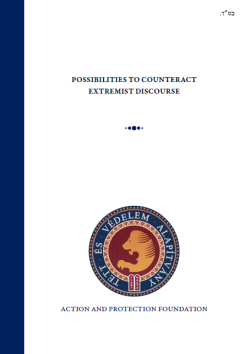Possibilities to counteract extremist discourse
Introduction
Action and Protection Foundation, media researcher Gábor Bernáth and the Political Capital Institute conducted a research project together titled The renewal of human rights (tolerant, democratic) reasoning and making it appealing to the young by means of humor, irony and facts. The project was financed by the Norwegian NGO Fund and was completed in April 2016.
Within the framework of the project we examined what possibilities there are to encourage non-violent and non-exclusive public discourse and how to make it more appealing. We identified various strategies for reasoning against extremist speech, and conducted online platform tests. Our project does not suggest that communication and reasoning are able to solve all social problems, but we are sure that the communication processes of public discourse could both help and hinder the solutions of social problems.
We conducted focus group discussions with a number of affected groups. During the over 30 group talks, hundreds of individuals — including young people, employees of NGOs, researchers, journalists, creative professionals, conservative thinkers and activists of groups that are primary targets of discrimination — shared their opinions. The discussions covered issues such as below:
- why does acceptance to discriminatory reasoning grow?
- How much anonymity in comments sections and Web 2.0 communication tools contribute to this growth and to the spread of violent communication? What are the relevant and useful answers to these problems?
- What are the possibilities and what are the limits to the use of legal-rational arguments against exclusion?
- Are there any advantages of social inclusion that could be highlighted? and if there are, how could these be communicated?
- What is the platform for positive and emotion-based reasoning? how and where could examples and traditions of inclusion and solidarity be shared?
- To what extent is it possible to make exclusion look ridiculous, challenge prejudices and show their discrepancies?
- Are there any communication strategies that participants should avoid because they are ineffective, or even harmful?
- What is needed to make non-discriminatory communication appealing to the young, and to the wider public?
- What would be the possible areas of this?
Based on the information gained from the group talks, we developed different user profiles for reasoning, and set up some tools and strategies for giving counter-arguments. We identified four types of reasoning profiles:
- rationally offensive/declarative,
- rational questioner/sarcastic,
- emotionally offensive/declarative,
- emotional questioner/sarcastic.
The user profiles and reasoning tools were tested on online platforms and also through short campaigns. Altogether 54 tests were carried out on online comment sections. The research was unique due to its real time testing. Our main question was how efficient this profiles and tools could be
when reasoning against extremist expressions and arguments. Our preliminary project report and project closure report summarize the findings of
our research. The present document is a shortened version of these reports.
We mainly focus on considerations that subscribe to the principles of those who conducted the research, and ideas they believe to be useful for practical purposes.
The complete summary can be accessed here (pdf, 328 kB)


